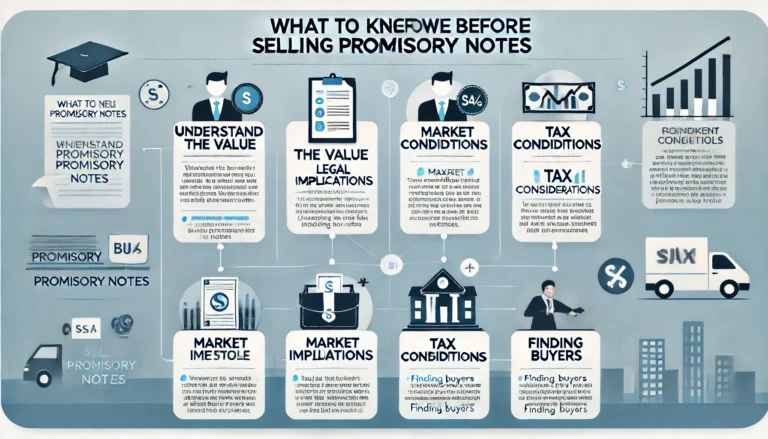How to Sell Business Notes
Selling business notes can be a lucrative way to liquidate an asset, generate quick cash flow, or reduce financial risk. However, the process can seem daunting if you’re unfamiliar with the intricacies involved. In this comprehensive guide, we’ll walk you through how to sell business notes effectively, from understanding their value to finding the right buyer. By the end of this article, you’ll have a clear understanding of the steps necessary to sell your business notes successfully.
Understanding Business Notes
What Are Business Notes?
Business notes, also known as promissory notes or seller carry-back financing, are financial instruments where the seller of a business agrees to receive a portion of the purchase price over time. These notes are legal documents that specify the terms of repayment, including the interest rate, payment schedule, and consequences of default. They are often used when buyers cannot secure full financing from traditional lenders.
Types of Business Notes
There are several types of business notes you might encounter, including:
- Promissory Notes: Simple agreements where the buyer promises to pay the seller a specified amount over a set period.
- Secured Notes: Notes backed by collateral, reducing the risk for the seller.
- Unsecured Notes: Notes without collateral pose a higher risk but often yield higher returns.
- Convertible Notes: Notes that can be converted into equity under certain conditions.
Understanding the type of note you hold is crucial, as it influences the sale process and the note’s value.
Preparing to Sell Your Business Notes
Assessing the Value of Your Note
Before you can sell your business note, you need to determine its value. Factors influencing the value include:
- Remaining Balance: The amount still owed on the note.
- Interest Rate: Higher interest rates generally increase the note’s value.
- Payment History: A consistent payment history boosts the note’s appeal.
- Term Length: Notes with shorter terms may be more attractive to buyers.
- Collateral: Secured notes are typically more valuable due to reduced risk.
Improving the Appeal of Your Note
To maximize the value and attractiveness of your note, consider the following tips:
- Verify Documentation: Ensure all paperwork is accurate and complete.
- Maintain Consistent Payments: Demonstrating a reliable payment history can increase buyer confidence.
- Clear Title: Resolve any outstanding legal issues related to the note.
- Professional Appraisal: Obtain a professional appraisal to provide an accurate value assessment.
Finding the Right Buyer
Potential Buyers for Business Notes
When selling your business note, you’ll encounter different types of buyers, including:
- Private Investors: Individuals looking for a steady return on investment.
- Institutional Investors: Companies specializing in buying and managing notes.
- Financial Institutions: Banks or credit unions that purchase notes to expand their portfolios.
- Brokers: Intermediaries who connect sellers with potential buyers for a fee.
Marketing Your Note
To attract the right buyer, you need to market your note effectively:
- List on Note Trading Platforms: Websites like NoteMarketplace.com or Paperstac.com allow you to list your note for sale.
- Engage with Brokers: Experienced brokers can help you find qualified buyers and negotiate favorable terms.
- Network: Leverage your professional network to find interested parties.
- Online Marketing: Use social media and online forums to reach potential buyers.
Negotiating the Sale
Setting Realistic Expectations
When negotiating the sale of your business note, it’s essential to set realistic expectations. Understand that buyers will factor in the risk associated with the note, which might lead to offers below face value.
Key Negotiation Points
Focus on these critical points during negotiations:
- Price: Be prepared to negotiate the sale price, keeping in mind the note’s assessed value.
- Terms: Discuss the terms of the sale, including payment methods and timelines.
- Discount Rate: Understand the buyer’s discount rate, which affects the note’s present value.
- Due Diligence: Allow the buyer to perform due diligence, providing all necessary documentation.
Closing the Sale
Finalizing the Agreement
Once you’ve agreed on terms with the buyer, the next step is to finalize the sale. This process includes:
- Drafting a Sale Agreement: Create a comprehensive sale agreement outlining all terms and conditions.
- Escrow Services: Consider using an escrow service to manage the transaction and ensure both parties fulfill their obligations.
- Transfer of Ownership: Complete the legal transfer of the note to the buyer.
- Receiving Payment: Ensure you receive payment as agreed upon in the sale terms.
Post-Sale Considerations
After the sale is complete, there are a few additional considerations:
- Tax Implications: Consult with a tax professional to understand the tax implications of your sale.
- Reinvestment: Plan how you will reinvest the proceeds from the sale to optimize your financial position.
- Legal Advice: Seek legal advice if necessary to ensure compliance with all relevant laws and regulations.
When it comes to selling business notes, understanding the process and preparing thoroughly can make all the difference. Selling business notes can provide significant liquidity, but it requires careful planning and strategic execution. By assessing the value of your note, marketing effectively, and negotiating smartly, you can maximize your returns and minimize potential risks. Whether you’re dealing with promissory notes, secured or unsecured notes, or even convertible notes, having a clear strategy is essential. Use trusted platforms and brokers to reach potential buyers and ensure you have all the documentation in order to facilitate a smooth transaction. Remember, selling your business note is not just about finding a buyer but finding the right buyer who understands the value and terms of your note.
Examples and Tips
To further illustrate the process, here are some practical examples and tips:
- Example: Suppose you have a secured business note with a remaining balance of $100,000, an interest rate of 6%, and a consistent payment history. This note will likely attract higher offers due to its lower risk.
- Tip: Maintain a detailed payment record. Potential buyers will scrutinize the payment history to assess reliability.
- Example: You listed your note on NoteMarketplace.com and received multiple offers. After negotiating, you settled on a price that was 90% of the note’s face value, reflecting a discount rate acceptable to both parties.
- Tip: Use professional appraisal services to justify your asking price and provide transparency to buyers.
Conclusion
Selling business notes can be a straightforward process if you understand the steps involved and prepare adequately. By assessing your note’s value, improving its appeal, and marketing effectively, you can attract the right buyers and negotiate favorable terms. Remember to use all available resources, such as professional appraisals and experienced brokers, to facilitate the sale. With careful planning and strategic execution, you can successfully sell your business note and achieve your financial goals.






